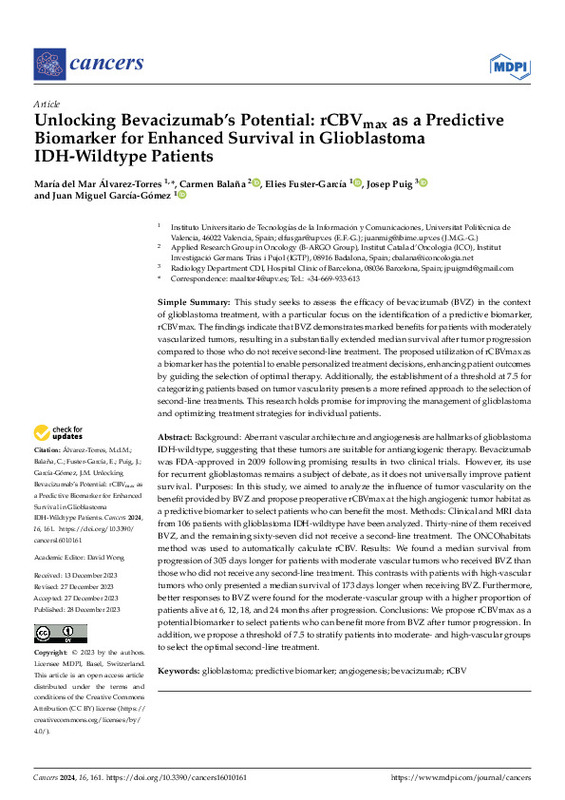JavaScript is disabled for your browser. Some features of this site may not work without it.
Buscar en RiuNet
Listar
Mi cuenta
Estadísticas
Ayuda RiuNet
Admin. UPV
Unlocking Bevacizumab's Potential: rCBVmax as a Predictive Biomarker for Enhanced Survival in Glioblastoma IDH-Wildtype Patients
Mostrar el registro sencillo del ítem
Ficheros en el ítem
| dc.contributor.author | Alvarez-Torres, Maria del Mar
|
es_ES |
| dc.contributor.author | Balaña, Carmen
|
es_ES |
| dc.contributor.author | Fuster García, Elíes
|
es_ES |
| dc.contributor.author | Puig, Josep
|
es_ES |
| dc.contributor.author | Garcia-Gomez, Juan M
|
es_ES |
| dc.date.accessioned | 2024-04-12T18:04:39Z | |
| dc.date.available | 2024-04-12T18:04:39Z | |
| dc.date.issued | 2024-01 | es_ES |
| dc.identifier.uri | http://hdl.handle.net/10251/203464 | |
| dc.description.abstract | [EN] Background: Aberrant vascular architecture and angiogenesis are hallmarks of glioblastoma IDH-wildtype, suggesting that these tumors are suitable for antiangiogenic therapy. Bevacizumab was FDA-approved in 2009 following promising results in two clinical trials. However, its use for recurrent glioblastomas remains a subject of debate, as it does not universally improve patient survival. Purposes: In this study, we aimed to analyze the influence of tumor vascularity on the benefit provided by BVZ and propose preoperative rCBVmax at the high angiogenic tumor habitat as a predictive biomarker to select patients who can benefit the most. Methods: Clinical and MRI data from 106 patients with glioblastoma IDH-wildtype have been analyzed. Thirty-nine of them received BVZ, and the remaining sixty-seven did not receive a second-line treatment. The ONCOhabitats method was used to automatically calculate rCBV. Results: We found a median survival from progression of 305 days longer for patients with moderate vascular tumors who received BVZ than those who did not receive any second-line treatment. This contrasts with patients with high-vascular tumors who only presented a median survival of 173 days longer when receiving BVZ. Furthermore, better responses to BVZ were found for the moderate-vascular group with a higher proportion of patients alive at 6, 12, 18, and 24 months after progression. Conclusions: We propose rCBVmax as a potential biomarker to select patients who can benefit more from BVZ after tumor progression. In addition, we propose a threshold of 7.5 to stratify patients into moderate- and high-vascular groups to select the optimal second-line treatment. | es_ES |
| dc.description.sponsorship | M.Á-T was supported by DPI2016-80054-R (Programa Estatal de Promoción del Talento y su Empleabilidad en I + D + i). This work was partially supported by the ALBATROSS project (National Plan for Scientific and Technical Research and Innovation 2017 2020, No. PID2019-104978RB-I00). This study was partially funded by the Fundació La Marató TV3 (665/C/2013). Grant PID2021- 127110OA-I00 (PROGRESS) was funded by MCIN/AEI/10.13039/501100011033 and ERDF, a way of making Europe. | es_ES |
| dc.language | Inglés | es_ES |
| dc.publisher | MDPI AG | es_ES |
| dc.relation.ispartof | Cancers | es_ES |
| dc.rights | Reconocimiento (by) | es_ES |
| dc.subject | Glioblastoma | es_ES |
| dc.subject | Predictive biomarker | es_ES |
| dc.subject | Angiogenesis | es_ES |
| dc.subject | Bevacizumab | es_ES |
| dc.subject | RCBV | es_ES |
| dc.subject.classification | FISICA APLICADA | es_ES |
| dc.title | Unlocking Bevacizumab's Potential: rCBVmax as a Predictive Biomarker for Enhanced Survival in Glioblastoma IDH-Wildtype Patients | es_ES |
| dc.type | Artículo | es_ES |
| dc.identifier.doi | 10.3390/cancers16010161 | es_ES |
| dc.relation.projectID | info:eu-repo/grantAgreement/AEI/Plan Estatal de Investigación Científica y Técnica y de Innovación 2017-2020/PID2019-104978RB-I00/ES/SISTEMA DE AYUDA A LA DECISION VALIDADO CLINICAMENTE BASADO EN MODELOS DE INTELIGENCIA ARTIFICIAL A NIVEL DE PIXEL PARA DECIDIR OPCIONES TERAPEUTICAS EN GLIOBLASTOMA/ | es_ES |
| dc.relation.projectID | info:eu-repo/grantAgreement/AEI/Plan Estatal de Investigación Científica y Técnica y de Innovación 2021-2023/PID2021-127110OA-I00/ES/EVALUACION MULTIPARAMETRICA DE LA PROGRESION DE LOS TUMORES CEREBRALES BASADA EN LA IA/ | es_ES |
| dc.relation.projectID | info:eu-repo/grantAgreement/AEI//PID2021-127110OA-I00//EVALUACIÓN MULTIPARAMÉTRICA DE LA PROGRESIÓN DE LOS TUMORES CEREBRALES BASADA EN LA IA/ | es_ES |
| dc.relation.projectID | info:eu-repo/grantAgreement/AEI//PID2019-104978RB-I00//SISTEMA DE AYUDA A LA DECISION VALIDADO CLINICAMENTE BASADO EN MODELOS DE INTELIGENCIA ARTIFICIAL A NIVEL DE PIXEL PARA DECIDIR OPCIONES TERAPEUTICAS EN GLIOBLASTOMA/ | es_ES |
| dc.relation.projectID | info:eu-repo/grantAgreement/Fundació La Marató de TV3//665%2FC%2F2013/ | es_ES |
| dc.relation.projectID | info:eu-repo/grantAgreement/AEI//DPI2016-80054-R//BIOMARCADORES DINAMICOS BASADOS EN FIRMAS TISULARES MULTIPARAMETRICAS PARA EL SEGUIMIENTO Y EVALUACION DE LA RESPUESTA A TRATAMIENTO DE PACIENTES CON GLIOBLASTOMA Y CANCER DE PROSTATA/ | es_ES |
| dc.rights.accessRights | Abierto | es_ES |
| dc.contributor.affiliation | Universitat Politècnica de València. Escuela Técnica Superior de Ingenieros Industriales - Escola Tècnica Superior d'Enginyers Industrials | es_ES |
| dc.description.bibliographicCitation | Alvarez-Torres, MDM.; Balaña, C.; Fuster García, E.; Puig, J.; Garcia-Gomez, JM. (2024). Unlocking Bevacizumab's Potential: rCBVmax as a Predictive Biomarker for Enhanced Survival in Glioblastoma IDH-Wildtype Patients. Cancers. 16(1). https://doi.org/10.3390/cancers16010161 | es_ES |
| dc.description.accrualMethod | S | es_ES |
| dc.relation.publisherversion | https://doi.org/10.3390/cancers16010161 | es_ES |
| dc.type.version | info:eu-repo/semantics/publishedVersion | es_ES |
| dc.description.volume | 16 | es_ES |
| dc.description.issue | 1 | es_ES |
| dc.identifier.eissn | 2072-6694 | es_ES |
| dc.identifier.pmid | 38201588 | es_ES |
| dc.identifier.pmcid | PMC10778147 | es_ES |
| dc.relation.pasarela | S\513764 | es_ES |
| dc.contributor.funder | Fundació La Marató de TV3 | es_ES |
| dc.contributor.funder | AGENCIA ESTATAL DE INVESTIGACION | es_ES |
| dc.contributor.funder | Agencia Estatal de Investigación | es_ES |
| dc.contributor.funder | European Regional Development Fund | es_ES |








